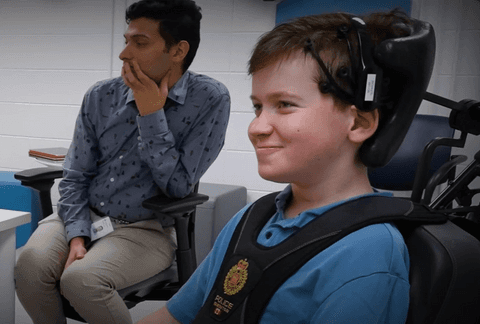
This BCI Program Connects Children with Disabilities to Their World
Heidi Duran
May 2, 2024
Share:





Faith's smile brightens the room. Fitted with an EPOC X EEG headset, she grins with delight as her neural signals tell a device to blow bubbles into the air. This young girl is just one of many children and adults who visit the Imagination Centre in Edmonton, Alberta, Canada, where brain-computer interfaces offer something we often take for granted - the ability to participate in the world around us.
The Imagination Centre, supported by the Glenrose Hospital Foundation, houses the Brain-Computer Interface (BCI) program. This dedicated team consists of families, clinicians, engineers, researchers, and leaders in the pediatric and rehabilitation space.
Patients at this facility have access to various brain computer interfaces. These include wheelchairs, video games, robots, remote-controlled cars, smart home technology, rolling balls, and of course, a bubble maker. It is one of the very few places in North America where this type of therapy is offered.

BCI Makes Participation Possible
Dr. John Andersen is a developmental pediatrician and Medical Director of the GRH BCI Program and Imagination Centre.
“BCI presents a new way to participate in play activities from which they might otherwise be excluded,” he tells EMOTIV. “Our research team is excited to learn how using BCI in play can affect children's sense of independence and autonomy, as well as their creativity and confidence.”
Liam has limited active control of his body. He used to enjoy watching his siblings play video games, but now he joins in using BCI.
Liam's favorite video game right now is Fall Guys, according to his mom in a more recent video. Judging by the fiercely determined look and sly grin on his face, we doubt Liam goes easy on his fellow players.

Above: Liam grins with a sense of satisfaction after turning on a smart home light using his thoughts. (Imagination Centre)
How BCI Encourages Child Development
Dr. Andersen says playing video games is fun but also important for kids' development. “Through play, children learn to understand the world around them. Play encourages creativity, imagination and it helps children learn social norms and how to cope with challenges. It allows them to make choices, solve problems, build friendships and enjoy a sense of freedom and joy.
“However, traditional childhood play often involves activities that require motor skills. For people with severe motor limitations, this presents a barrier to fully participating in play, restricting opportunities for learning and exploring and can contribute to social isolation.”
Imagination Centre isn’t just for kids. The program also welcomes individuals with adult-onset conditions such as Amyotrophic lateral sclerosis (ALS), also known as Lou Gehrig's Disease.
“For people who have severe limitations in movement, BCI acts as a digital bridge between intention and interaction with the world through a computer interface. BCI offers a way to participate in life in ways previously unimaginable,” says Dr. Andersen.
The program has eight BCI home kits that include EPOC X headsets and a Microsoft Surface. Families can borrow the units and enjoy meaningful participation at home, too.
You can learn more about Imagination Centre and donate on their website HERE.
Faith's smile brightens the room. Fitted with an EPOC X EEG headset, she grins with delight as her neural signals tell a device to blow bubbles into the air. This young girl is just one of many children and adults who visit the Imagination Centre in Edmonton, Alberta, Canada, where brain-computer interfaces offer something we often take for granted - the ability to participate in the world around us.
The Imagination Centre, supported by the Glenrose Hospital Foundation, houses the Brain-Computer Interface (BCI) program. This dedicated team consists of families, clinicians, engineers, researchers, and leaders in the pediatric and rehabilitation space.
Patients at this facility have access to various brain computer interfaces. These include wheelchairs, video games, robots, remote-controlled cars, smart home technology, rolling balls, and of course, a bubble maker. It is one of the very few places in North America where this type of therapy is offered.

BCI Makes Participation Possible
Dr. John Andersen is a developmental pediatrician and Medical Director of the GRH BCI Program and Imagination Centre.
“BCI presents a new way to participate in play activities from which they might otherwise be excluded,” he tells EMOTIV. “Our research team is excited to learn how using BCI in play can affect children's sense of independence and autonomy, as well as their creativity and confidence.”
Liam has limited active control of his body. He used to enjoy watching his siblings play video games, but now he joins in using BCI.
Liam's favorite video game right now is Fall Guys, according to his mom in a more recent video. Judging by the fiercely determined look and sly grin on his face, we doubt Liam goes easy on his fellow players.

Above: Liam grins with a sense of satisfaction after turning on a smart home light using his thoughts. (Imagination Centre)
How BCI Encourages Child Development
Dr. Andersen says playing video games is fun but also important for kids' development. “Through play, children learn to understand the world around them. Play encourages creativity, imagination and it helps children learn social norms and how to cope with challenges. It allows them to make choices, solve problems, build friendships and enjoy a sense of freedom and joy.
“However, traditional childhood play often involves activities that require motor skills. For people with severe motor limitations, this presents a barrier to fully participating in play, restricting opportunities for learning and exploring and can contribute to social isolation.”
Imagination Centre isn’t just for kids. The program also welcomes individuals with adult-onset conditions such as Amyotrophic lateral sclerosis (ALS), also known as Lou Gehrig's Disease.
“For people who have severe limitations in movement, BCI acts as a digital bridge between intention and interaction with the world through a computer interface. BCI offers a way to participate in life in ways previously unimaginable,” says Dr. Andersen.
The program has eight BCI home kits that include EPOC X headsets and a Microsoft Surface. Families can borrow the units and enjoy meaningful participation at home, too.
You can learn more about Imagination Centre and donate on their website HERE.
Faith's smile brightens the room. Fitted with an EPOC X EEG headset, she grins with delight as her neural signals tell a device to blow bubbles into the air. This young girl is just one of many children and adults who visit the Imagination Centre in Edmonton, Alberta, Canada, where brain-computer interfaces offer something we often take for granted - the ability to participate in the world around us.
The Imagination Centre, supported by the Glenrose Hospital Foundation, houses the Brain-Computer Interface (BCI) program. This dedicated team consists of families, clinicians, engineers, researchers, and leaders in the pediatric and rehabilitation space.
Patients at this facility have access to various brain computer interfaces. These include wheelchairs, video games, robots, remote-controlled cars, smart home technology, rolling balls, and of course, a bubble maker. It is one of the very few places in North America where this type of therapy is offered.

BCI Makes Participation Possible
Dr. John Andersen is a developmental pediatrician and Medical Director of the GRH BCI Program and Imagination Centre.
“BCI presents a new way to participate in play activities from which they might otherwise be excluded,” he tells EMOTIV. “Our research team is excited to learn how using BCI in play can affect children's sense of independence and autonomy, as well as their creativity and confidence.”
Liam has limited active control of his body. He used to enjoy watching his siblings play video games, but now he joins in using BCI.
Liam's favorite video game right now is Fall Guys, according to his mom in a more recent video. Judging by the fiercely determined look and sly grin on his face, we doubt Liam goes easy on his fellow players.

Above: Liam grins with a sense of satisfaction after turning on a smart home light using his thoughts. (Imagination Centre)
How BCI Encourages Child Development
Dr. Andersen says playing video games is fun but also important for kids' development. “Through play, children learn to understand the world around them. Play encourages creativity, imagination and it helps children learn social norms and how to cope with challenges. It allows them to make choices, solve problems, build friendships and enjoy a sense of freedom and joy.
“However, traditional childhood play often involves activities that require motor skills. For people with severe motor limitations, this presents a barrier to fully participating in play, restricting opportunities for learning and exploring and can contribute to social isolation.”
Imagination Centre isn’t just for kids. The program also welcomes individuals with adult-onset conditions such as Amyotrophic lateral sclerosis (ALS), also known as Lou Gehrig's Disease.
“For people who have severe limitations in movement, BCI acts as a digital bridge between intention and interaction with the world through a computer interface. BCI offers a way to participate in life in ways previously unimaginable,” says Dr. Andersen.
The program has eight BCI home kits that include EPOC X headsets and a Microsoft Surface. Families can borrow the units and enjoy meaningful participation at home, too.
You can learn more about Imagination Centre and donate on their website HERE.
Solutions
Support
Company

© 2026 EMOTIV, All rights reserved.

Your Privacy Choices (Cookie Settings)
*Disclaimer – EMOTIV products are intended to be used for research applications and personal use only. Our products are not sold as Medical Devices as defined in EU directive 93/42/EEC. Our products are not designed or intended to be used for diagnosis or treatment of disease.
Note on Translations: Non-English versions of this website has been translated for your convenience using artificial intelligence. While we strive for accuracy, automated translations may contain errors or nuances that differ from the original text. For the most accurate information, please refer to the English version of this site.
Solutions
Support
Company

© 2026 EMOTIV, All rights reserved.

Your Privacy Choices (Cookie Settings)
*Disclaimer – EMOTIV products are intended to be used for research applications and personal use only. Our products are not sold as Medical Devices as defined in EU directive 93/42/EEC. Our products are not designed or intended to be used for diagnosis or treatment of disease.
Note on Translations: Non-English versions of this website has been translated for your convenience using artificial intelligence. While we strive for accuracy, automated translations may contain errors or nuances that differ from the original text. For the most accurate information, please refer to the English version of this site.
Solutions
Support
Company

© 2026 EMOTIV, All rights reserved.

Your Privacy Choices (Cookie Settings)
*Disclaimer – EMOTIV products are intended to be used for research applications and personal use only. Our products are not sold as Medical Devices as defined in EU directive 93/42/EEC. Our products are not designed or intended to be used for diagnosis or treatment of disease.
Note on Translations: Non-English versions of this website has been translated for your convenience using artificial intelligence. While we strive for accuracy, automated translations may contain errors or nuances that differ from the original text. For the most accurate information, please refer to the English version of this site.
